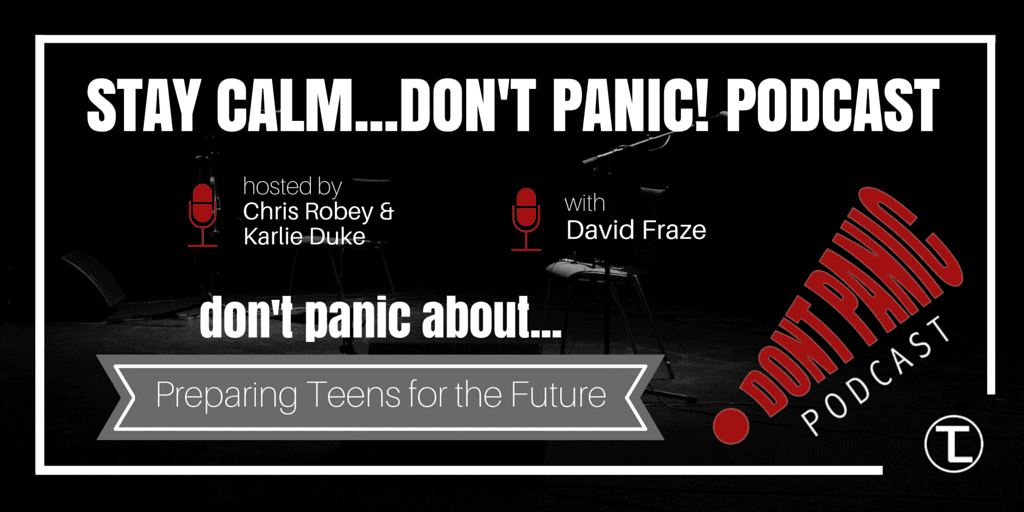
Don’t Panic – Get Involved in Schools!
School is a major part of every teenager’s life. In this episode, we discuss the importance of adult involvement in schools & how to serve your community. Don’t panic, get involved & make a difference!
Donate Now

School is a major part of every teenager’s life. In this episode, we discuss the importance of adult involvement in schools & how to serve your community. Don’t panic, get involved & make a difference!

How do you interact with a teenager in the foster care system? Don’t miss Shiloh Jones’ tips on how to be helpful and encouraging in the midst of a difficult situation!

Podcast: Play in new window | Download
We have some bad news…your teen is going to grow up and become an adult. A scary thought, we know! But in this episode, join the conversation with Dr. David Fraze about what this transition looks like and how we can better prepare teenagers to emerge as functioning, responsible adults. Your teen will eventually leave you, but don’t panic – you’ve got this!
[bctt tweet=”Our students are incredible people that can be molded. – @DontPanicTalk @DavidFraze1″ via=”no”]
David Fraze (D.Min., Fuller Theological seminary) is Special Assistant to the President of Lubbock Christian University and Fort Worth Area Director and Manager of DFW Character Coaches for Fellowship of Christian Athletes. He is a popular speaker and writer on all things youth ministry and adolescence. Based out of North Richland Hills, Texas, David has been working with students for over 25 years. Follow him on Twitter!
Chris Robey is the Program Director for Teen Lifeline, Inc. Earlier in his career while working as a youth minister, Chris earned a Masters Degree in Family Life Education from Lubbock Christian University to better equip his work with teenagers and families. Chris’ career and educational opportunities have exposed him to teenagers from a variety of backgrounds. Follow him on Twitter!
Karlie Duke started working as Teen Lifeline’s Communications Director after graduating from Abilene Christian University with a degree in Communications with a minor in Family Studies. Karlie has worked with teenagers for the past 5 years and is passionate about encouraging students to live better stories. Follow her on Twitter or Instagram!
If you have a question about something you heard or just want to give us some feedback, please leave us a comment below. We would love to hear from you!


The more I work with teenagers, the more evident is that they are their own worst enemy and biggest critic.
Check out this story from one of our facilitators, Josh Hardcastle, about a conversation that happened in his support group with teenage guys:
A couple of weeks ago, we were talking about the negative influences and negative voices in our lives. Some of the guys in the group spoke up and were talking about how when other people put them down, they believe it. They believe that they…
Are Lazy.
Are Stupid.
Won’t Succeed.
Are Slow.
Are Punks.
Can’t get anything right.
So then I threw out the question, “What if you didn’t believe them?”
I had remembered a line from a book I read that said something like, “The names that we embrace are the names that we become.” I shared with them some of the struggles with the names that I had been called in High School by a coach. After hearing it so many times, I began to believe that I was that name.
There was something about this whole conversation and group time that really clicked with them. I could actually see hope and strength starting to resonate with a few of them. They were sitting up straight and absolutely silent. Not because they didn’t know what to say, but because it looked like they were thinking about not believing they were these names that they had been called for so long.
Towards the end of the group time, one of the guys asked, “So does this work with me too? Because I put myself down more than anybody else.”
Man that broke my heart! But we were able to have a conversation as a group about what that looked like and how we can avoid embracing the negative names and voices we call ourselves. I closed out the group by asking, “What do you guys notice about everyone’s pages and what they heard from the important voices in their lives?” A few of them gave me the answers that most everybody had written down their family or best friends, but one of my quiet kids raised his hand and said, “Everyone has more than two important, positive voices who speak into their lives.”
I took it one step further and asked, “So what does that mean?” Another guy jumped in and said, “That we should be listening and focusing on the positive voices and ignoring the negative ones.”
Boom. Nailed it.
Teenagers are surrounded by all kinds of negative and critical voices, but these voices do not just come from outsiders. Sometimes, the worst thoughts are coming from inside their own heads.
So what can we do? How can we help encourage teenagers to think positively and be a better judge of their self-worth? I have a few suggestions for what we can do as parents, teachers, mentors and friends:
1. Ask questions that will allow them to brag.
Instead of bringing up that “B” on a test, or the fact that they were late getting home (…again), ask one of these questions: “What is one thing that you did really well today?” or “How did you help someone today?”
By asking these question, you are prompting their own brain to focus on the positive aspects of the day. You are telling them that they are capable of great things and you want to hear about the things that they are going well.
Let’s help train teens to engage in beneficial bragging! Bragging that fosters a good sense of self-worth and positive self-esteem.
2. Point out the little things.
Did your teen wash the dishes without being asked? Say, “THANK YOU!”
Resist the urge to say something like, “What’s wrong with you?! You never do the dishes without asking!” or “Finally! Now you’re doing the dishes every night for the rest of your life!”
I know this might be a silly example, but by encouraging the little things they do without adding a backhanded dig or sarcastic comment, they will also pay attention to the important role they can play!
Tell them when you are proud. Hang up that last report card on the fridge. Brag about the way they love on their siblings. Teenagers are necessary, helpful, hardworking and FUN – don’t forget that!
3. Encourage realistic goal-setting.
When I am hard on myself or engage in negative self-talk, it tends to be when I am disappointed in myself or feel like I haven’t reached the goal I set for myself. After a busy week, I am upset that the house is a little messy and that I didn’t cook every meal at home. I beat myself up when I miss one tiny detail on a big project, or find a typo in a blog post.
Goals are a great thing to have, but we should be realistic and not sweat over the little things! Encourage teenagers to set small goals. When they reach that goal, help them celebrate and especially if they don’t matter – forget about the tiny things that might not be perfect.
Perfection isn’t a realistic goal. But here are a few realistic goal examples for teenagers:
Once you help them come up with, write down and spend time on their goals, don’t forget to celebrate when a goal is reached!
What do you think of these ideas? How else can we encourage teenagers to engage in positive self-talk?

Podcast: Play in new window | Download
In this episode, Sally Gary, author of Loves God, Likes Girls, joins us to talk about same-sex attraction. You’ll get to hear her own coming-out story and advice on how to better have conversations with teenagers about homosexuality. Don’t panic about same-sex attraction – positive, beneficial conversation can happen!
[bctt tweet=”The thought of not belonging is one of the most painful things you can experience. – @dontpanictalk @centerpeaceinc” via=”no”]
In this episode, we mentioned the following resources:
 Sally Gary is the Executive Director of CenterPeace where she works to encourage churches, schools and families to have conversations about same-sex attraction. Before dedicating herself to CenterPeace full-time, she was a professor of communication at Abilene Christian University for 10 years. Sally is also a well-respected speaker and author of Loves God, Likes Girls: A Memoir.
Sally Gary is the Executive Director of CenterPeace where she works to encourage churches, schools and families to have conversations about same-sex attraction. Before dedicating herself to CenterPeace full-time, she was a professor of communication at Abilene Christian University for 10 years. Sally is also a well-respected speaker and author of Loves God, Likes Girls: A Memoir.
 Chris Robey is the Program Director for Teen Lifeline, Inc. Earlier in his career while working as a youth minister, Chris earned a Masters Degree in Family Life Education from Lubbock Christian University to better equip his work with teenagers and families. Chris’ career and educational opportunities have exposed him to teenagers from a variety of backgrounds. Follow him on Twitter!
Chris Robey is the Program Director for Teen Lifeline, Inc. Earlier in his career while working as a youth minister, Chris earned a Masters Degree in Family Life Education from Lubbock Christian University to better equip his work with teenagers and families. Chris’ career and educational opportunities have exposed him to teenagers from a variety of backgrounds. Follow him on Twitter!
Karlie Duke started working as Teen Lifeline’s Communications Director after graduating from Abilene Christian University with a degree in Communications with a minor in Family Studies. Karlie has worked with teenagers for the past 5 years and is passionate about encouraging students to live better stories. Follow her on Twitter or Instagram!
If you have a question about something you heard or just want to give us some feedback, please leave us a comment below. We would love to hear from you!
